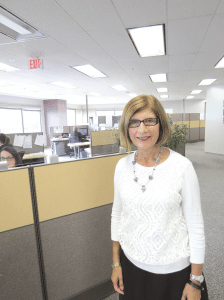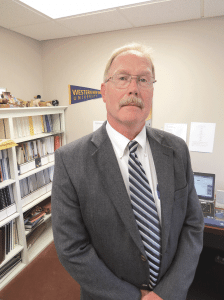
What’s in a Name?
Schools See Value in Swapping ‘School’ for ‘University’
Carol Leary was asked about her institution’s decision to call itself a university, rather than a college, and the reasons behind that move. But before going there, she took a few minutes — actually, more than a few — to chronicle and explain the many times over the past 117 years that the name over the school’s front door has changed.It began as Bay Path Institute, when it was located in downtown Springfield and focused on training men and women for roles in business and accounting, she noted, adding that it became Bay Path Secretarial School in 1945 after it relocated to Longmeadow and focused on training women to become executive secretaries; most of the region’s prominent CEOs had a “Bay Path secretary,” said Leary. In the ’60s, the institution became Bay Path Junior College as it expanded into other areas of study with a liberal-arts base, and then Bay Path College in 1988, when it became a four-year institution.
Those changes were not about semantics, said Leary, the school’s president since 1995, but, rather, reflections about what the school had evolved into.
And that is the case with this latest change in the signage as well.
“A quarter-century later, we’re in a whole different way of educating,” she explained. “We educate on the ground, we educate online, we are educating 12 months of the year, and we’re educating 24/7. That word ‘university’ reflects the complexity of what we have evolved into, what we have become.”
Indeed, the school not only meets the state’s revised requirements for what constitutes a university — graduate programs in four or more distinct fields of study (more on this later) — but, more importantly, it has the look and feel of a university, not merely the accepted definition of one, said Leary.
It has five campuses — the main location in Longmeadow, as well as sites in Springfield, East Longmeadow, Burlington, and Sturbridge-Charlton — and several colleges within the institution itself, including the American Women’s College, featuring online undergraduate degrees, the One-Day-a-Week College, and 19 graduate programs. And it has ambitious plans to soon establish its first doctorate program.
“We are a university,” said Leary. “This represents who we are and how we have evolved and grown; I can’t verify it with numbers, but I believe Bay Path is the fastest-growing women’s college in the country, and the change to ‘university’ reflects all of that.”
It also reflects what could be considered a minor yet intriguing trend in higher education over the past several years. A number of schools across the country and several in the Bay State, including Bentley, Leslie, Western New England College, Massachusetts College of Pharmacy and Health Sciences, and six of the nine state schools, have made a similar change. Others, like Springfield College, have thought about it and decided not to do so, mostly because it considers that word ‘college’ part of its brand and culture. Meanwhile, other schools are still thinking about it.
There are several reasons why schools might make such an adjustment, with perception being at or near the top of the list. In many foreign countries, for example, the word ‘college’ denotes an institution similar to or just above a high school, said Richard Wagner, who researched the matter for Western New England, which he serves as director of Institutional Research & Planning, as part of a strategic planning initiative undertaken in 2008.
He noted that, since WNEC became WNEU in 2011, the number of international students on campus has risen considerably, from 33 in the fall of 2011, the first semester as a university, to 81 just two years later, with more expected next month. There are several factors that may have contributed to this increase, he said, but he has little doubt that the name change has been one of them.
Meanwhile, the word ‘university’ may also help with recruiting in this country, he went on, adding that, with some schools, having ‘college’ in the name can be a competitive disadvantage.
“The word ‘university’ is meant to convey a certain breadth and depth of programs,” he explained. “Legally speaking, it has different meanings in different places; for us, it was a question largely of the fact that we were already structured to be how a university would expect to be structured, and ‘university’ was a better moniker for us and more representative of what we are. The administration here would be firmly convinced that this was a positive move for us to make.”
For this issue and its focus on education, BusinessWest takes an in-depth look at why there are now several universities in Western Mass., and why the change in terminology represents more than a new name and logo on T-shirts for those who have taken this step.
New-school Thinking
Tracing the steps that took Bay Path from a college to a university, Leary said that, while the matter had been discussed rather informally for several years, things started heating up in late 2011 when a graduate of the original Bay Path Institute, then-92-year-old trustee Bernard Mussman, spoke up at one of the panel’s sessions not long before he passed away.
“He raised his hand near the end of the meeting and said, ‘I’ve been on this board for 12 years; we’re now very complex, and we should become a university,’” she recalled. “And everyone sort of just stopped. No one immediately responded to Bernie, but here was a 92-year-old Bay Path Institute alum suggesting that we were a university and no longer a college.”
Nothing really happened with Mussman’s suggestion until roughly a year later, she went on, noting that, as part of something called Planning Vision 2016, the latest in a series of three-year strategic plans undertaken by the school, one of five cross-functional teams comprised of faculty and staff came forward with the recommendation that the school consider becoming a university.
Such a transition was made possible a few years earlier, and not long after the state Legislature voted to change the names of six state colleges, including Westfield State, to universities in a move that reflected what was becoming a nationwide trend. (Three of the schools, Massachusetts College of Liberal Arts in North Adams, Massachusetts Maritime Academy in Buzzards Bay, and Massachusetts College of Art and Design in Boston, chose to maintain the status quo.)
In making the change, the state also lowered the bar when it came to the prerequisites for university status. The old standard was two distinct doctoral programs, while the new measure was four distinct graduate programs, a threshold the state schools easily met.
Fearing that this change might give the state’s many private schools a competitive disadvantage, some of them lobbied — through the Assoc.of Independent Colleges and Universities in Massachusetts (AICUM), which represents 60 private schools in the Commonwealth — for essentially the same privilege.
“Our argument with the Board of Higher Education was that, from a consumer-clarity perspective, the state shouldn’t have a public institution just renamed a ‘university’ by the Legislature, and have a private college that may in fact have many more master’s-degree or graduate-degree offerings be hamstrung by the previous regulations, and they agreed with that,” AICUM President Richard Doherty told BusinessWest. “The argument we made was that, whatever policy the state decided on, it should apply equally to public and private schools.”
Doherty noted, as Wagner did, that there is little, if any, technical difference, definition-wise, between a college and a university, and that many institutions with ‘college’ in their names are, in fact, universities. But he noted that the latter word could easily be perceived as a school with a larger breadth and depth of programs.
Defining Moments
In the wake of the recommendation to at least study the feasibility of becoming a university — one of many action steps in that strategic plan, eventually named “Evolution to Revolution” — Bay Path began an extensive period of research, said Leary, noting that school leaders looked at a number of institutions, especially women’s colleges, that had made the change from ‘college’ to ‘university.’ That list included Chatham University in Pittsburgh and Trinity Washington University in the nation’s capital.
“We looked at why they became a university,” she noted, “and at what they had to do to become a university, because each state is different.”
That research revealed that the change hasn’t negatively impacted the schools, and has probably yielded some benefits, said Leary.
“They said it was very positive,” she noted, “and that it gave them more to talk about internationally because of the word ‘university.’”
Meanwhile, Bay Path officials also listened to their own students, one of whom suggested at an open forum that ‘university’ would carry more weight with potential employers looking at the lines on a résumé.
“I had never thought of that,” Leary went on. “She was defining ‘university’ by the worth of the name, which was interesting, because we were looking at it mostly from the standpoint that we were already operating as a university, and a change would only verify that.”
Despite those positive sentiments, Bay Path alumni and some of those working at the school had some concerns that needed to be addressed, said Leary.
“They didn’t want to lose the personal touch, and we said that would always be a hallmark of Bay Path,” she explained. “They were worried that on the main campus, class sizes would get bigger for traditional students; we said, ‘that can’t happen because we don’t have large classrooms — the largest one seats 60.’ They were worried that we were going to charge so much more, and we told them tuition would remain the same.
“And they were really worried that we were going to go co-ed,” she went on. “But we assured them that we would stay all women.”
The matter eventually went to the board of trustees, which voted to seek approval for the transition to university status from the Mass. Department of Higher Education. The change became official, and Bay Path became the first women’s university in the Commonwealth, on July 1.
When asked how, in five years, the school might be able to quantify the results of the transition, Leary noted that this was a good, if difficult-to-answer, question, adding that it will likely be easier to qualify the benefits.
“I think that, if we have more students from around the country and around the world, we’ll certainly be able to quantify that,” she said. “But will those students be coming just because we’re a university? That might be hard to determine.
“The bottom line is that ‘university’ makes it clearer to us and our prospective students who we are — it just makes more sense,” she went on. “And we’re very proud of who we are.”
Marsha Marotta, interim vice president of Academic Affairs at Westfield State University, echoed those sentiments. She said the term ‘university’ more accurately portrays what the school has become, and it has also helped improve perceptions of the institution, both externally and internally.
“The tangible impacts of the name change were obvious; it reflected our reality in terms of what we already were doing,” she said, listing everything from comprehensive undergraduate programs to graduate and online programs; from high expectations for faculty to research agendas supported by federal and other grants, such as a National Science Foundation grant for innovative approaches to teaching math as part of the liberal arts. “The name ‘university’ also more accurately reflects who we are in a global context, since the international understanding of college equates with a high-school level of education.
“The name change is also about aspirations and identity,” she went on. “The name ‘university’ makes us more mindful of what we do and more accurately captures the way we are — which in turn changes how we think about ourselves. This was an unexpected consequence, and allows us to think more expansively about the institution. Saying it out loud changes how we think about the institution, which becomes a catalyst for new things.”
Name of the Game
Three years after Western New England transitioned to university status, Wagner believes the change has benefited the school, as it has others that may not have the international reputations that have enabled some colleges to go on with that word in their name.“For us, I think ‘college’ was primarily a disadvantage because it didn’t really convey what the campus represented,” he said. “‘University’ allows us to better represent who we are an as an institution.
“For some schools that have very well-known reputations, like Dartmouth or Boston College, it’s not much of an issue,” he went on. “But for schools that don’t have international name recognition, ‘college’ can be disadvantageous.”
Overall, he considers the change one of many factors that has enabled Western New England to ride out what has been a challenging post-recession period.
“The university status, in association with some of the other things we’ve done over the past few years, such as starting the School of Pharmacy, have allowed us to weather the prolonged recession in a relatively good way,” he explained. “Although we’ve been stressed, like a lot of other tuition-driven institutions, we’ve been able to continue building, adding programs, and so on. I think of it as being one element in our ability to get through some rather difficult times.”
Perhaps the most visible impact has come in the number of foreign students now enrolled at the school. There were only nine international students at WNEC in 2009, he noted, adding that the nearly ten-fold increase still represents a very small portion of the overall student body of roughly 3,800. Still, the surge is significant, and for many reasons.
The first is the cultural diversity gained through having students from around the globe, he told BusinessWest, adding that another is a greater ability to withstand domestic economic downturns, and a third is the fact that foreign students are much more likely to pay full tuition rather than relying on financial aid.
“One of the things about internationalization is that, when things might not necessarily be good economically in the United States, they may be better overseas, and vice versa,” he noted.
Over the past few years, Wagner said, there’s been what he called a “follow-the-leader mentality” when it comes to changing ‘college’ to ‘university,’ with more schools making the change perhaps out of a feeling of necessity.
“I think there’s a certain amount of pressure on some institutions to do it,” he explained, “because it’s been done in so many other places.” But some schools, including Springfield College, apparently aren’t feeling that pressure.
“The leadership at Springfield College has, in the past, considered a name change to a university,” said Steve Roulier, a spokesperson for the school. “But given the reputation of our mission and current academic strengths, we have decided to remain Springfield College. The college consistently ranks in the top tier of the U.S. News “Best Colleges” list as a leader in providing a broad and balanced educational experience. We are proud to be known as Springfield College.”
Sign of the Times
Bay Path has a rather intriguing tradition for the start of the new school year, and its students have to get up pretty early in the morning to take part.
It’s called the Awakening, and it gets underway at 5:30 a.m. Participants light candles and celebrate the school’s history and tradition. They walk together down Longmeadow Street to the school’s circle, where there are a few speeches, followed by breakfast. This year, there will be an additional twist — unveiling new signage that features that word ‘university.’
One could say it’s the start of a new era, said Leary, adding that there is a great deal of excitement accompanying the name change. But in reality, that new era started some time ago.
The word ‘university,’ as she said, only puts an exclamation point on it.
George O’Brien can be reached at [email protected]






